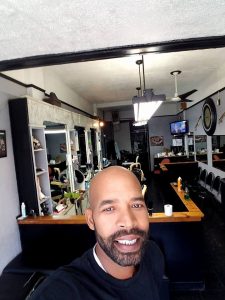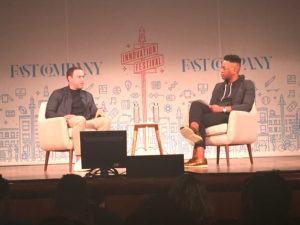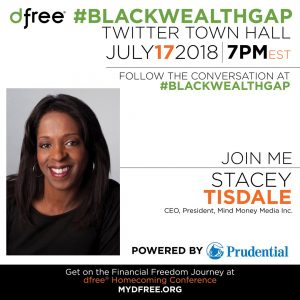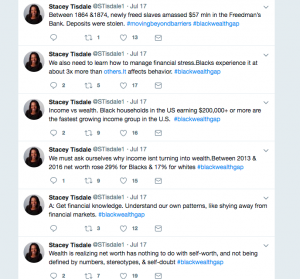Self–efficacy refers to an individual’s belief in his or her capacity to execute behaviors necessary to produce specific performance attainments (Bandura, 1977, 1986, 1997). Self-efficacy reflects confidence in the ability to exert control over one’s own motivation, behavior, and social environment.
Let’s begin by acknowledging the fact that, beliefs about personal abilities influence occupational choices, career paths, job-seeking behavior, and job performance (Bandura, 1997). Therefore educating our communities about self worth and relevance should never be compromised. The fact that we have avenues to communicate via smartphones and social media should only enhance the message we want to share as we work to connect with as many people as possible. One of the first people I spoke with about self-efficacy was Edward Perkins, a business owner, music executive, and semi professional golfer that hails from the city of Mt. Vernon, New York. Mr. Perkins is a great example of self-efficacy because he has made the commitment to motivate himself, as he motivates others in his community. Perkins barbershop serves as a haven to the Mt. Vernon community. On any given day you can enter EP’s (nickname) shop and in engage in conversations with lawyers, judges, councilmen, musicians and athletes. The historical recognition of the black barbershop as a significant racial and communal institution makes it an ideal location to better understand how blacks construct their identity (Harris-Lacewell 2004). His business is the perfect example of how we can build awareness, especially about self-efficacy in our urban communities. The key characteristics of any concept of community are organization of population by geographic neighborhood, the individual feeling of belonging to a group, and relationship based on functional interdependence (Park 1936). When speaking about business and life, I asked Mr. Perkins if he had any advice for the millennials who are working to achieve their goals, he replied, “it takes time to reach your goal, what your looking at is over 20 years of hard work.”

Perkins, Edward. “Owner/Ed in the barbershop.” 2018. jpeg
Ed Perkins
This is a conversation I had with Ed Perkins at his barber shop earlier this year. We talked about the importance of self motivation and how patience and consistency usually win.
After speaking with Ed Perkins about diligence and patience, I decided to get another perspective on self-efficacy from a 38-year-old music mogul named Scooter Brauner. Scooter is a self-made businessman that started promoting college parties in Atlanta. What makes Brauner unique is the fact that he constantly works to keep himself and his staff motivated. The game is designed, in part, to understand prosocial behavior or voluntary actions such as sharing that can benefit others or groups (Gurven and Winking, 2008). Braun attributes much of his success to hard work, good timing, and trust in the process of growth. The fact that Mr. Braun is not African American, helped me view his story from the reverse side, which leads me to believe that self-efficacy has nothing to do with prejudice or discrimination, either you have the heart and desire to be successful or you don’t. Like Arthur Brisbane told us, “Success comes before hard work only in the dictionary.” Bottom line is many people in our urban communities are looking for handouts or directions to achieving socioeconomic mobility. I found out the hard way that you will be waiting a hell of a long time if that is what you are looking for. My question at hand is, are we educating are communities to be self sufficient through self-efficacy, or are we enabling people to rely on excuses to explain or define failure? I also believe that this type of thinking needs to become a way of life if we are to promote Black Economic Empowerment in our communities.

Scooter Braun and KC Ifeanyi
Scooter Braun is just one of the young successful entrepreneurs in the world. I wonder if his approach to life, which he attributes to guidance and understanding from his parents, gave him an edge that many kids in our urban communities don’t grow up with. I wonder if he was born with the desire and willingness to achieve through genetics. I wonder if Scooter would ever be able to relate to the struggles of people in urban communities. I wonder if Scooter feels responsibility to his community to share information that will enhance his neighborhood, or even if there is a demand for that type of communication. Whatever the case maybe, his success proves that its possible, even though his background maybe different he found a away to overcome his obstacles and clawed is way to the top. This is the type of information and reenforcement people from urban communities must have to be driven to succeed socioeconomically to produce Black Economic Empowerment.
As we work to educate to achieve socioeconomic mobility in our urban communities we have to take in consideration the power of social media as an avenue to reach people who otherwise might not be able to be reached. Digital platforms like Facebook, Twitter, Tumblr, and Instagram provide informational opportunities to connect with more people that we could ever imagine to encounter in person. Although there is plenty of foolishness going on as well, I tend to train my mind to gear toward organizations, pages, and individuals who are committed providing substance, especially when it comes to providing information for dialogue about Black Economic Empowerment. Jeff Desjardins, Founder and Editor-in-Chief at Visual Capitalist stated, “Social media is deeply linked to a series of platforms (Facebook, LinkedIn, YouTube, etc.) that control distribution. They are the plumbing that allows (or doesn’t allow) content to spread.” Zibu Mthiyane – founder and president of enterprise development organization, MMC South Africa, stated, “Civil society has even more power through social media, we can boycott brands now and question them live.” We have all learned that in economic development, social media is a critical tool for business promotion and attraction. With that being said, we must embrace social media, the right way, and expose the fact that many people in our urban communities will never make the town hall meetings about economic empowerment, but they won’t leave home without their handheld devices. So we must find away to bring the town hall meeting to them. Subsequently, social media has become away to connect with audiences in our urban communities, and if we direct our energy in the right places we can use this median to educate our community on how to attain socio economic mobility.

Tisdale, Stacy. “@STisdale” July 17, 2018.
On July 17, 2018, CEO, President of Mind Money Inc., Stacy Tisdale hosted a financial literacy conversation on Twitter Town Hall. Intrigued by Ms. Tisdale’s decision to bring her Twitter account to the community on an issue that I was currently researching, I followed the thread #BlackWealthGap. Tisdale examined facts like why the economics of urban communities is not transferring into wealth. She highlighted the fact that black households in the US earning $200,000+ or more are the fastest growing income group in the U.S. She also tweeted that many people in urban communities lack understanding in regard to market patterns and financial wellness. The fact that between 2013 and 2016 black net worth rose 29% is amazing, yet many black Americans in the inner cities continue to struggle to make ends meet. Ms. Tisdale finally commented, “Wealth is realizing net worth has nothing to do with self-worth, and not being defined by numbers, stereotypes, & self-doubt.”
Ultimately, I was really excited about Ms. Tisdale’s attempt to bring substance and awareness to the online communities. Thread #BlackWealthGap has reached hundreds of people since it was first recorded on June 4, 2014. I believe that this method of communication will increase our ability to reach people outside of daily interactions. This display also heightened my awareness about the economic status of African Americans for which in this study identified primarily with urban communities. It’s obvious that community is the first step as we work for Black Economic Empowerment, ultimately as we achieve empowerment, we create sustainability for the American economy.

Tisdale, Stacy. “@STisdale” July 17, 2018.
I started this self-efficacy section with a song I wrote about reaching for the next level in life. Although the previous sections about education and opportunity acted as a prerequisite for this section, I felt the need to examine the importance of finding strength from within to strive for better living conditions and sustainability in our urban communities. This song is simple about rising above one’s current situation to create better circumstances socially, economically, and spiritually. Through lyrics like, “to that mother that raises a child on her own, to that father that loves his kids, but can’t come home,” I explore situations that are unfortunately common in many of our urban communities. This section on self-efficacy allows us to deal with what it will actually take through application to create socio economic mobility for residents in our inner cities.
Can I Fly?
Can I Fly, And Be Free Like A Bird In The Sky O Why
I’m Feeling High, It’s Like Love Has Got Me In The Sky, O Why Did I O Why
To A Nation Of Millions That Paid The Cost
To the Soldiers In Iraq that’s taking Shorts
To that mother that raises A child on her own
To that father that loves his kids, but can’t come home
Can I Fly, And Be Free Like A Bird In The Sky O Why
I’m Feeling High, It’s Like Love Has Got Me In The Sky, O Why Did I O Why
To The Demons In My Head
At The Homies Breaking Bread
At my nephew, he gon let it be
At my sister she gon help me see
Can I Fly, And Be Free Like A Bird In The Sky O Why
I’m Feeling High, It’s Like Love Has Got Me In The Sky, O Why Did I O Why
You get love when you lost
You get fame when you pay the cost
You don’t see me when I’m on my bending knees
Saying Father Help Us Please
Can I Fly, And Be Free Like A Bird In The Sky O Why
I’m Feeling High, It’s Like Love Has Got Me In The Sky, O Why Did I O Why


